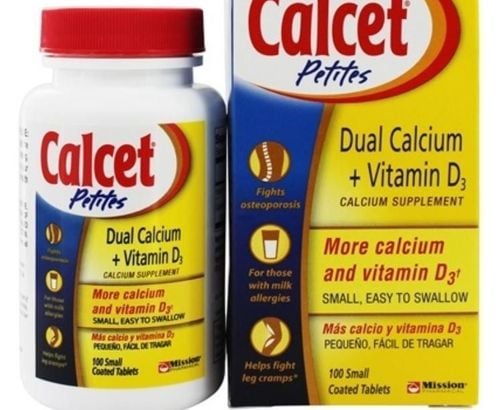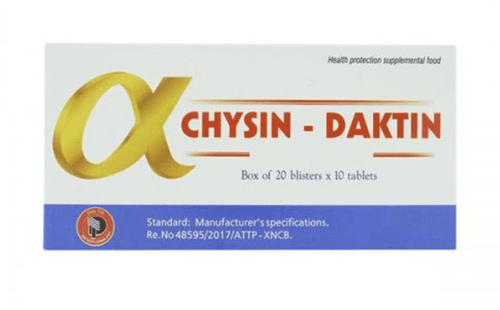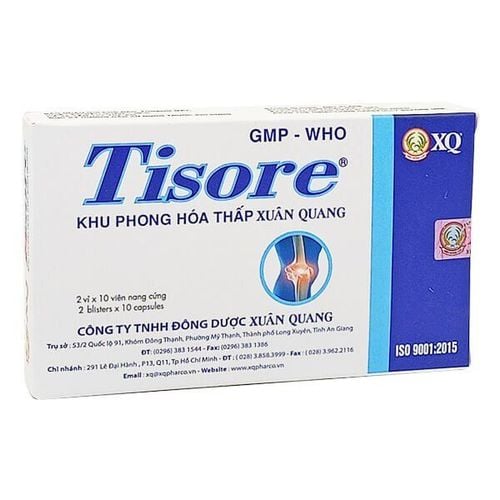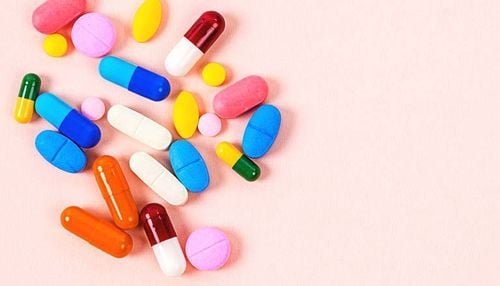This is an automatically translated article.
Posted by Master, Doctor Mai Vien Phuong - Department of Examination & Internal Medicine - Vinmec Central Park International General Hospital
Ulcerative colitis is a fairly common disease in today's life, the disease significantly reduces the quality of life and causes dangerous complications. Usually during treatment, patients may encounter some side effects that make patients feel uncomfortable and doubt the results of treatment.
1. Learn about ulcerative colitis treatment
Ulcerative colitis is a type of inflammatory bowel disease (IBD). People with ulcerative colitis have an overactive immune system that attacks and inflames the large intestine, including the colon and rectum. Inflammation leads to symptoms such as abdominal cramps, diarrhea, and fatigue. There is no cure for ulcerative colitis. The goal of ulcerative colitis treatment is to control symptoms and prevent future flare-ups.
Certain medications that doctors recommend to treat ulcerative colitis work by calming the immune system to reduce inflammation. Other treatments relieve specific symptoms such as diarrhea or bloating.
Medications commonly used to treat symptoms of ulcerative colitis include:
Diarrhea: loperamide (Imodium) Pain relievers: acetaminophen (Tylenol), nonsteroidal anti-inflammatory drugs (NSAIDs) including aspirin, ibuprofen (Advil, Motrin) and naproxen (Aleve) Aminosalicylate: sulfasalazine, balsalazide, mesalamine, olsalazine Corticosteroids: prednisone, prednisolone, methylprednisolone, budesonide Immunomodulators: azathioprine, cyclosporine, tacrolimus 6-MP), methotrexate Biologics: adalimumab (Humira), infliximab (Remicade) Janus kinase (JAK) inhibitors: tofacitinib (Xeljanz) Antibiotics: ciprofloxacin (Cipro), metronidazole (Flagyl), rifaximin (Xifaxan) All these drugs side effects can range from mild to severe. Your doctor will help you find a treatment that minimizes your ulcerative colitis symptoms with side effects that you can tolerate. It is important to openly discuss your symptoms with your doctor. Your treatment needs may change over time.
2. Some common side effects of drugs for ulcerative colitis and how to handle them
2.1 Acne
Corticosteroids, immunomodulatory drugs can cause acne. However, the acne will go away after you stop taking the medicine. Your doctor may prescribe acne creams or antibiotics to help control skin problems in the meantime.
2.2 Worry, nervousness
Drugs that can cause anxiety and nervousness such as; antibiotics, corticosteroids. If these symptoms bother you, talk to your doctor. They can adjust your dose.

Lo lắng, bồn chồn là một tác dụng phụ khi điều trị viêm loét đại tràng
2.3 Loss of appetite
Aminosalicylates, antibiotics, immunomodulators, corticosteroids can all cause this condition. Medications for stomach upset and nausea are associated with ulcerative colitis symptoms, and medications can make you lose your appetite. That can make it hard for you to get the nutrients you need.
Work with your doctor or dietitian to make sure you're getting enough calories. Try to eat a variety of nutrient-dense and nutritious foods when you're hungry.
2.4 Abdominal pain, abdominal cramps
Aminosalicylates, antibiotics, biologics, immunomodulators can cause abdominal pain and cramping. If this occurs, ask your doctor whether you should take the medicine on a full stomach or with food to prevent stomach irritation.
2.5 Constipation
Constipation can be caused by, aminosalicylates, immunomodulatory drugs. When constipation occurs, try to:
Drink more water to make stools softer and easier to pass. Exercise regularly to keep stool moving through the colon. Talk to your doctor or dietitian about foods you can eat to help you have regular bowel movements without triggering ulcerative colitis symptoms. Ask your doctor if you should take a laxative or stool softener.
2.6 Diarrhea
What drugs can cause diarrhea such as aminosalicylates, antibiotics, immunomodulatory drugs. Now ask your doctor about taking an over-the-counter (OTC) diarrhea medication or antispasmodic to reduce bowel movements and pain. Drink extra water to replace what you lost due to diarrhea.
Consider keeping a food diary to find out which foods cause the most symptoms. Avoid foods that make symptoms worse. These typically include:
Spicy or fatty foods Foods high in fiber, such as whole grains and some vegetables and fruits Dairy products Caffeine

Người bệnh khi điều trị viêm loét dạ dày có thể bị tiêu chảy
2.7 Dizziness
Aminosalicylates, corticosteroids, immunomodulators, biologics can cause dizziness. When you see symptoms of dizziness, you should sit or lie in a dark and quiet room until the dizziness stops. Elevate your head with two or more pillows when you sleep at night. Avoid activities that could be hazardous, such as driving or operating heavy machinery. If dizziness persists, ask your doctor if you should change your medication. In addition, in some cases, the patient may also experience dry mouth.
2.8 Stomach upset
Aminosalicylates, immunomodulatory drugs have also been identified to cause abdominal distension. Limit or avoid foods that aggravate gas such as: high-fiber vegetables (broccoli, Brussels sprouts, cabbage), fiber-rich whole grains such as bran, dairy products, fatty foods or fried, refined and sugary foods, artificial sweeteners. Talk to your doctor about using an OTC gas treatment that contains simethicone.
2.9 Headaches
Medications that can cause headaches include: aminosalicylates, antibiotics, biologics, corticosteroids, immunomodulators, JAK inhibitors. Research shows that migraines are more common in people with IBD, possibly related to inflammation. You find that your migraines or headaches actually improve when you start treatment for ulcerative colitis.
Over-the-counter pain relievers such as acetaminophen can relieve occasional headaches. If you have frequent headaches, ask your doctor if you need to reduce your dose of your ulcerative colitis medication or switch to a different medication. Tell your doctor if you have a sudden severe headache. Because they can be linked to a more serious condition.
2. 10 sour / reflux
Aminosalicylates, antibiotics, and immunomodulators can cause heartburn and reflux. For now, avoid foods like citrus, alcohol, and chocolate that can irritate your esophagus and make heartburn worse. At this point you should:
Don't smoke. Avoid eating close to bedtime. Do not lie down immediately after eating. Always talk to your doctor before taking OTC heartburn medications including proton pump inhibitors (PPIs) or H2 receptor antagonists (H2RAs).
2.11 Joint or muscle pain
Aminosalicylate, biologic, immunomodulatory drugs can cause joint or muscle pain. The most effective treatment is a heating pad or an OTC pain reliever that can provide short-term relief from joint or muscle pain. If they persist, ask your doctor if you should adjust or change your medication.
2.12 Nausea and vomiting
What drugs can cause nausea and vomiting such as: aminosalicylates, antibiotics, biologics, corticosteroids, immunomodulators. The following tips may help with nausea and vomiting:
Take the medicine with food. Eat several small meals throughout the day instead of three large meals. Eat slowly and try to avoid activity after eating. Choose bland foods like crackers and toast. Avoid greasy, fried or sweet foods. Drink water or ginger ale to stay hydrated.
2.13 Infections
Aminosalicylates, immunomodulators, biologics, corticosteroids, JAK inhibitors, antibiotics can cause infections. Many of these drugs can decrease your protective immune response. Antibiotics also throw off the balance of good and bad bacteria in the body. These factors can increase the risk of respiratory, urinary, and intestinal infections.
Make sure you keep all your vaccines up to date, including those for flu, pneumonia and shingles. Report any of the following signs of infection to your doctor:
Fever Cough Pain when you urinate Bloody stools, diarrhea, abdominal pain and cramps, which could be signs of a Clostridium difficile (C. diff) infection )

Nhiễm trùng đường tiêt niệu có khả năng xảy ra khi điều trị viêm loét đại tràng
2.14 Sleep problems
Medicines used to treat ulcerative colitis can make it difficult to sleep. IBD itself has also been linked to sleep disturbances. Ulcerative colitis symptoms can make it harder to sleep. Poor sleep can also increase inflammation in the body associated with conditions like ulcerative colitis. The following tips can improve sleep:
Try to get a little exercise every day. Go to bed at the same time every night. Avoid heavy meals and screen time before bed. Ask your doctor if you can take your medication earlier in the day so it doesn't affect your sleep.
2.15 Weak bones, osteoporosis
Corticosteroids can cause weak bones, osteoporosis. Both corticosteroids and ulcerative colitis are themselves associated with bone loss. To support strong bones eat a healthy diet rich in vitamin D and calcium. Do weight-bearing exercises like walking and resistance training. Avoid smoking and limit alcohol use, which can weaken bones.
Ask your doctor if you should take calcium and vitamin D supplements to strengthen your bones. Your doctor may also recommend a bone density test. If you have low bone density, you may need to take a bone-strengthening medicine, such as alendronate (Fosamax) or denosumab (Prolia).
In addition, corticosteroids can also cause weight gain. This is a common side effect of corticosteroids. It usually appears on the face, back of the neck, and abdomen. You will begin to lose weight once you stop taking the steroid medication. While you are still taking this medicine, monitor your calorie intake and exercise regularly to prevent excessive weight gain.
In fact, many of the side effects on this list will go away as your body gets used to the medication. Let your doctor know if any of these problems persist or bother you. They may change the dose or switch you to a different medicine that doesn't cause the same side effects.
In fact, the treatment of ulcerative colitis is inherently very persistent when there is currently no definitive cure for the disease. Therefore, in the course of treatment, if the patient encounters any problems, it is necessary to contact the doctor for advice and appropriate suspensions.
Department of Gastroenterology - Vinmec International General Hospital has many achievements in examining and treating gastrointestinal diseases from simple to complex such as: endoscopic diagnosis of stomach diseases, colon, detect inflammation, ulcers, polyps, cancer, find HP bacteria, detect cancer early in the digestive tract. Endoscopy treatment of hemostasis in gastrointestinal bleeding, ligation of esophageal varices in cirrhosis of the liver. , endoscopic gastrointestinal polyp removal.... When the department gathers a team of doctors with many years of experience, combined with a system of modern equipment and machinery. As a result, the treatment becomes more effective as well as helping the patient to soon stabilize in terms of health.
Please dial HOTLINE for more information or register for an appointment HERE. Download MyVinmec app to make appointments faster and to manage your bookings easily.
ReferenceAntibiotics [Fact sheet]. (2018).
crohnscolitisfoundation.org/sites/default/files/legacy/assets/pdfs/antibiotics.pdf
Be aware antibiotics: Smart use, best care. (2020).
cdc.gov/patientsafety/features/be-antibiotics-aware.html
Bloating & wind. (2019).
crohnsandcolitis.org.uk/about-crohns-and-colitis/publications/bloating-wind
Checkley LA, et al. (2019). Incidence and management of infusion reactions to infliximab in an alternate care setting. DOI:
1007/s10620-018-5319-6
Cheraghi SC, et al. (2016). A survey on migraine prevalence in patients with inflammatory bowel disease - A single center experience.
mejdd.org/index.php/mejdd/article/view/1495.pdf














